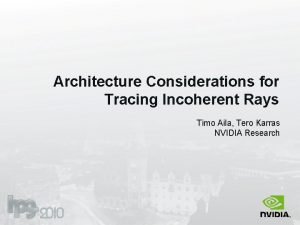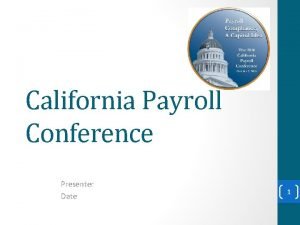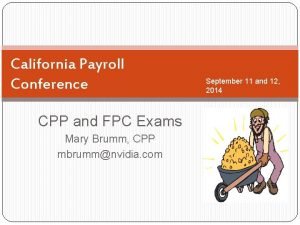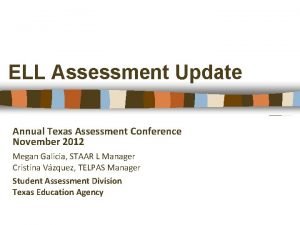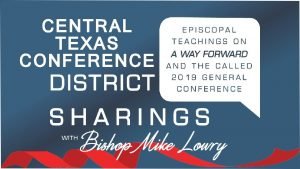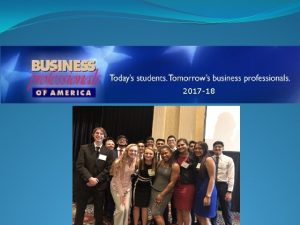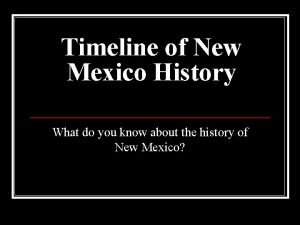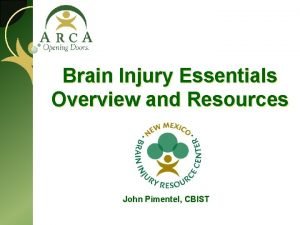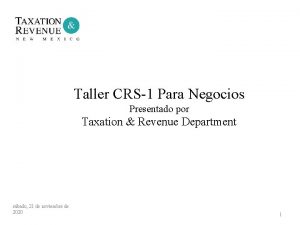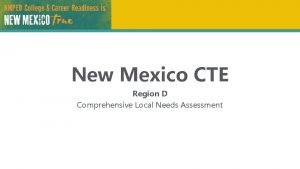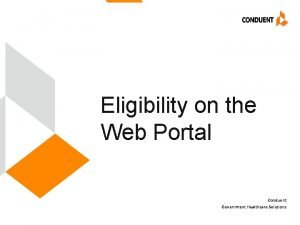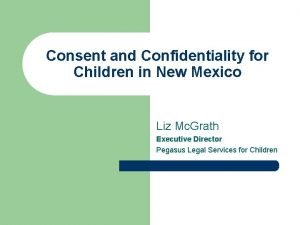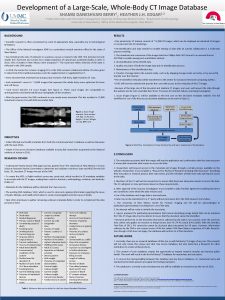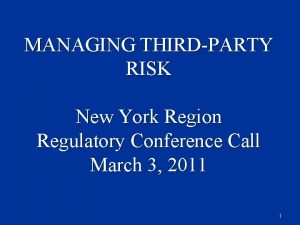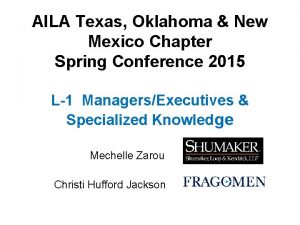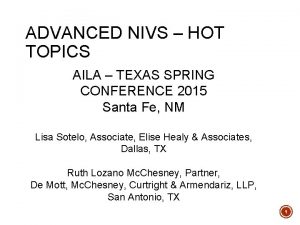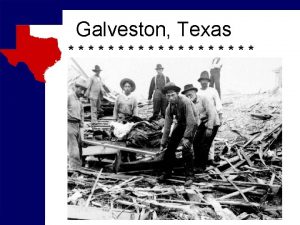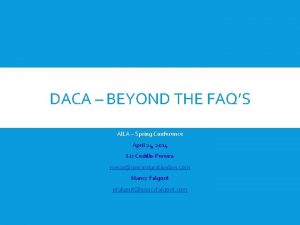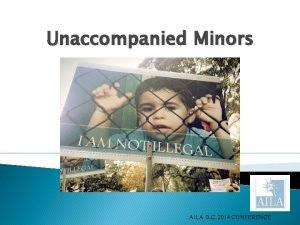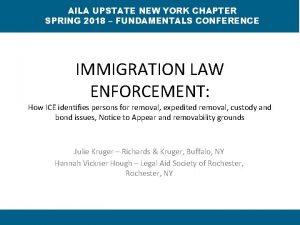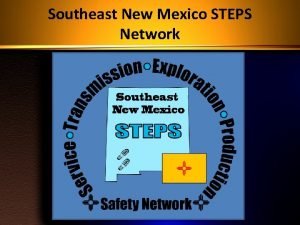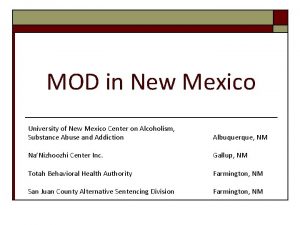AILA Spring Conference 2014 Texas New Mexico Oklahoma









































- Slides: 41

AILA Spring Conference 2014 Texas, New Mexico & Oklahoma Presented by Susan Bond, PC & Noaman Azhar & Azhar Law Firm

Beyond the Basics & Ethical Quagmires Permanent Residence through PERM Program Electronic Review Management

The ethical considerations posed here will include scenarios frequently encountered in the course of pursuing permanent residence through the labor certification process, or PERM, and will attempt to address these issues as related to dual representation.

These scenarios proceed from the initial intake and case review stage through the processing of the I-485 application for adjustment to lawful permanent resident status.

Scenario #1 Your corporate client calls you and is ready to start the green card process. The client has previously sponsored only H-1 B petitions so they are new to this process. They want to know what the education and experience requirements are for the position in the PERM application, and want to know if they can list a Master’s degree requirement, because the foreign national employee has suggested this and it will make them all very happy.

Issues Raised Does the attorney suggest requirements that may be more appealing to the company and foreign national, or should the attorney review the employer’s corporate structure, the other workers in similar positions, and advise the employer based on these criteria, to determine the job requirements?

Initial Analysis The attorney should look at the big picture in dispensing advice that will impact the ability of the company to sponsor this and other workers in the future. This is chess, not checkers. The job requirements must represent the employer’s actual minimum requirements for the job opportunity and the employer must not have hired workers with less training or experience for the jobs substantially comparable to that involved in the job opportunity. 20 C. F. R. § 656. 17 (i)(1)(2)

Scenario #2 The foreign national calls your office, a friend having shared your contact information. The foreign national is employed on a full-time basis in to H-1 B status, and has a willing employer who will process the green card application, provided the employee agrees to pay back the costs of the green card process should the employee voluntarily quit his job within 3 years of being granted permanent residence. Unless the employee agrees, the employer will not sponsor the green card, the employee will run out of H-1 B time, and will be required to depart the US.

Issues Raised • Can the company shift the burden of fees or costs to the employee who is willing to pay? • Can the company enter into a contractual arrangement whereby the employee works for a given number of years in exchange for the employer paying the costs associated with the PERM or green card process?

Initial Analysis Under no circumstances may an employer seek or receive any payment of any kind for any activity related to obtaining permanent labor certification. 20 C. F. R. § 656. 12 Remember, the employer, the foreign national and attorney must attest to this on the ETA 9089, and audit responses may request additional affirmations that no money has changed hands for the process.

Scenario #3 The employer contacts the attorney to let her know that the company is ready to proceed with labor certifications on behalf of 3 of its best workers, who are all currently in H-1 B status. The company also discloses that the company is on the verge of bankruptcy but has opened several new contracts that will put them back in the black financially. However, if the foreign national workers learn of this financial situation, they would likely resign. This would jeopardize the company’s financial recovery, as all of the workers hold jobs in high demand are of course in the fifth year of H-1 B status, which you filed on their behalf.

Issues Raised • Does the financial viability of the company raise issues for the labor certification process? • If the company can’t proceed with the labor certification, does the attorney have an ethical obligation to disclose to the employee the reasons they can’t proceed, or will disclosure that the process can’t proceed be sufficient to discharge the attorney’s duties?

Initial Analysis • The employer must prove that it has the ability to pay the offered wage to the beneficiary, from the time that the ETA 9089 is submitted, until the adjudication of the I-485 adjustment of status application. The attorney must review the petitioner’s financial documents and determine if, based on a preponderance of the evidence, it meets this standard. 8 C. F. R. 204. 5(g)(2)

Initial Analysis, cont. • Whether or not a duty has been created to the employee will be fact specific. As determining the ability to pay the wages is part of the attorney assessing the case and determining whether to proceed, it is not likely the attorney owes any disclosures regarding the reasons for not proceeding.

Scenario #4 The final certification of the ETA 9089 has been received, and the company is ready to proceed with filing the I-140 immigrant petition for the company’s employee, who holds H-1 B status. The employee contacts your office to ask you if the company will file the I-140 via premium processing, so that the priority date will be locked in upon approval. The foreign national employee expresses his concern over rumors about the company’s financial troubles and is worried about his status and upcoming 6 year end date, and hints that he has thoughts of leaving the company.

Issues Raised • Does the attorney have an obligation to notify the employer regarding the foreign national’s implied intention to leave the company as soon as the I 140 is approved? • Would the fact that the employer paid all fees related to the PERM process and H-1 B, but the foreign national worker will pay the filing fees and legal fees for the I-140, including the fees for premium processing change your opinion?

Initial Analysis • Whether disclosures are required, or a withdrawal is required, would depend on several factors. Has the attorney clearly outlined the terms of dual-representation? Has the attorney discussed issues openly with all parties prior to this scenario? • An attorney’s ethical duties do not depend on which party paid the attorney’s fees, but rather on whether or not the client has a reasonable expectation that there exists an attorney/client

Scenario #5 One of your best corporate clients just lost its HR Manager and has requested that you review the resumes received in connection with the PERM process and draft emails for applicants who are not qualified.

Issues Raised • Would it be acceptable to perform an initial review of the resumes in connection with the PERM process, if the company would have the final decision on interviewing the applicant?

Initial Analysis Attorneys cannot be involved in the interview process or have influence over the applicants considered for the position. To maintain integrity throughout the process, the attorney should offer guidance and legal advice throughout the process to ensure the employer is following the recruitment procedures pursuant to the regulations. However, the attorney should not be involved in the vetting of applicants. 20 C. F. R. § 656. 10 (b)(2)(i)

Scenario #6 You have an approved labor certification and are gathering the information and evidence for the I-140 immigrant petition. Due to time constraints and other factors, you failed to determine whether or not the foreign national met the minimum requirements in the PERM advertisements prior to submitting the ETA 9089. The foreign national has now disclosed to you that he only holds a 3 year bachelor’s degree from his home country of India, and he knows that he is not qualified for the position in the EB 2 category, as the requirements for the position are a Bachelor’s degree or the equivalent, and 5 years of experience. The foreign national has asked you to submit the I-140 as EB-2, and is willing to pay the legal fees and filing fees, knowing the case may be denied. The company has agreed to this course of action and is willing to waive any liabilities in the event the I-140 is denied.

Issues Raised • Do you submit the I-140 immigrant petition in the EB-2 category? • What considerations or issues may arise choosing this strategy?

Initial Analysis The Texas Rules of Professional Conduct prohibit frivolous claims and require truthfulness in all statements. • Rule 4. 01 Truthfulness in Statements to Others • In the course of representing a client a lawyer shall not knowingly make a false statement of material fact or law to a third person. • Rule 3. 01 Meritorious Claims and Contentions • A lawyer shall not bring or defend a proceeding, or assert or controvert an issue therein, unless the lawyer reasonably believes that there is a basis for doing so that is not frivolous.

Scenario #7 The ETA 9089 and the I-140 immigrant petition filed by your corporate client have been approved, the foreign national has been working for the corporate client in H-1 B status for over five years, and his family is in H-4 status. You have represented all parties throughout the process. The foreign national has now accepted a job offer with another company, and the corporate client, very unhappy that they have spent thousands of dollars on this process, requests that you notify USCIS that the employee is no longer employed pursuant to H-1 B status. The company further tells you that it will not keep the job offer open, and requests you also notify USCIS that it will not use the I-140 immigrant petition.

Issues Raised • What consequences may follow the notification to USCIS that the company will not utilize the I-140 Immigrant Petition? • Is the attorney required to notify USCIS that an employer has no intention of holding a permanent job offer open for the foreign national? • Does the foreign national have a protected interest in the I-140?

Initial Analysis • Unlike the requirement that the petitioner notify USCIS of changes in terms and conditions of H-1 B employment, there is no legal requirement that the petitioner notify USCIS that an employee who has a pending or approved I-140 immigrant is no longer with the sponsoring company. • The company may believe there is a compelling reason to request that USCIS be notified in the event a foreign national is no longer employed. In general, this will be true only if the company’s ability to pay will be in question if and when they sponsor other employees for permanent residence

Initial Analysis, cont’d The company may need to balance its interests in future filings with the impact of notifying USCIS that the previous employee is no longer employed. If in fact the employer is determined to notify the USCIS, in general the attorney should not be involved in this transaction, aside from notifying the foreign national and company of the consequences of such action. If all parties agree in writing at the outset that the I 140 may be withdrawn if the employee departs before obtaining permanent residence, and that you

Scenario Your firm is approached by a #8 potential corporate client that owns a small construction company. The company knows that many of its employees do not have work authorization but is willing to sponsor the employees to get them lawful status; the employees are like family and the business could not operate without them. The company is ready to pay you for the PERM process, and if needed, the I-140 and I 485 fees, and let your firm take care of each and every step in the process. In fact, the company would prefer to remain ignorant of each of the employee’s status until they all have work authorization or hell freezes over, whichever comes first.

Issues Raised • Can you ethically represent the company or the worker, or both in this situation? • Could representing the company or employee give rise to any criminal charges, either for the law firm or the client(s)? • Does the attorney have a duty to discuss the possibility of inadmissibility at this point, or is the only obligation regarding the PERM process?

Initial Analysis • • • An attorney can ethically represent both parties but full disclosure is required as the employer has to be apprised that they will be disclosing on the PERM application they are employing an alien who does not have lawful work authorization. • Texas Rules of Professional Conduct 1. 03 (b) Communication • A lawyer shall explain a matter to the extent reasonably necessary to permit the client to make informed decisions regarding the representation. The client could subject themselves to criminal charges and/or fines for employing illegal workers. • The employment of unauthorized aliens is unlawful. 8 U. S. Code § 1324 a(1). The attorney does have an obligation to address inadmissibility and any other potential hurdles from the initiation of the PERM process through permanent residency so the client can make an informed decision regarding proceeding. • Texas Rules of Professional Conduct 1. 03 (b) Communication • A lawyer shall explain a matter to the extent reasonably necessary to permit the client to make informed decisions regarding the representation.

Scenario #9 You have been asked to represent a small company that wants to file a labor certification on behalf of the director of operations, who is the owner’s uncle.

Issues Raised Can the company pursue the labor certification given the family relationship?

Initial Analysis • Where a familial relationship exists between the stockholders, corporate officers, or partners and the foreign national, the company must disclose the relationship on Form ETA 9089, and be prepared to provide proof that a bona fide job opportunity exists, and that the foreign national does not have any influence or control over the job opportunity. This may be satisfied by copies of partnership agreements, corporate documents, and financial records including shareholder distributions and investment amounts for each owner. 20 C. F. R. § 656. 17 (l) • Employers are strongly discouraged from sponsoring family members or close friends on PERM applications. 20 CFR § 656. 17 (L) • A relationship invalidating a bona bide job offer may arise where the beneficiary is related to the petitioner by “blood” or it may “be financial, by marriage, or through friendship. ” Matter of Chamdal Food Mart, 2000 -INA-92 (BALCA May 15, 2000); and Matter of Sunmart 374, 2000 -INA-93 (BALCA May 15, 2000) 20 CFR §

Scenario #10 The I-140 has been approved, and through some miracle known only to the visa bulletin gods, the foreign national’s priority date is current and you have filed the I-485 applications on behalf of the employee and his family members, which are all pending. The company, also your client, paid all fees associated with the labor certification process, I-140, the H-1 B and H-4 petitions, but the employee has paid all fees associated with the I -485 process. The foreign national employee is a Security Systems Engineer, and your corporate client provides security solutions to its clients. The employee has just called you to request your assistance or a referral for a criminal attorney. The employee discloses to you that he been arrested and charged with conspiracy to defraud his insurance company by providing a falsified claim.

Issues Raised • Do you have an obligation to disclose the arrest to the employer, given the employee paid all of the fees associated with the I-485 process? • Do you still owe any duties to the corporate client in this situation? • Since the arrest happened after the I-485 was filed, do you have a duty to amend the I-485 filing or document the arrest and outcome to the USCIS? • Would non-disclosure be deemed misrepresentation to the Service?

Initial Analysis The arrest and ultimate conviction could result in the employee being inadmissible and placed in removal proceedings. If convicted, the employer may be liable to its own clients if there any security or background check requirements for the employee to perform services to the clients, due to the nature of the employment. The attorney must also decide whethere is an obligation to notify USCIS that the I-485 needs to be amended and the arrest disclosed, given that employment-based adjustment applicants do not always receive the opportunity for an interview.

Initial Analysis, cont. Other considerations would be the duty of loyalty and confidentiality, and how to balance disclosure of the facts without harming either or party. In disclosing, carefully consider the expectations of privacy that each party may have, and whether you have openly shared communications previously. See 2006 U. S. Dist. Lexis 11160 -Employee brought suit against attorney for disclosure of criminal activity, however the court found no breach of confidentiality and no connection between attorney disclosure of crimes and termination of employment.

Initial Analysis, cont. Whethere is a duty to amend the application or withdraw would be based on the totality of the circumstances, including a determination by the attorney whether it is possible to proceed while serving the best interests of both parties. Given that employment-based adjustments are not always afforded an interview, amended or notifying the Service may be the only chance the parties have to amend the record before adjudication. Also consider 8 C. F. R. 1003. 102(c) which proscribes willfully misleading a CIS officer concerning a material or relevant matter.

From Initial Consult to Adjustment of Status— the Company and Foreign National Must be Informed Fully inform the company regarding the PERM process, including payment of fees, the job offer and requirements, testing the labor market, financial requirements/ability to pay, any triggers to audits and chance of success.

And remember, no matter what….

Follow those darn rules.
 Aila hartikainen
Aila hartikainen Timo aila
Timo aila Timo aila
Timo aila What river separates texas from louisiana
What river separates texas from louisiana Hisd spring break 2014
Hisd spring break 2014 Shadow payroll example
Shadow payroll example Payroll conference 2014
Payroll conference 2014 Payroll conference 2014
Payroll conference 2014 Four seasons korean movie
Four seasons korean movie Spring summer autumn
Spring summer autumn Acwa spring conference
Acwa spring conference Spring io conference 2020
Spring io conference 2020 Stfm abstract submission
Stfm abstract submission Texas women in higher education
Texas women in higher education Biology staar
Biology staar Central texas conference umc
Central texas conference umc Texas assessment conference
Texas assessment conference Bpa state leadership conference texas
Bpa state leadership conference texas Timeline of new mexico history
Timeline of new mexico history New mexico medical insurance pool
New mexico medical insurance pool New mexico interlock license
New mexico interlock license New mexico brain injury resource center
New mexico brain injury resource center Form acd31075
Form acd31075 New mexico board of pharmacy
New mexico board of pharmacy New mexico ffa
New mexico ffa Cte school new mexico
Cte school new mexico Meteor crater new mexico
Meteor crater new mexico New mexico tech
New mexico tech Cau thang thanh giuse new mexico
Cau thang thanh giuse new mexico Sunset baseball field
Sunset baseball field Special olympics new mexico
Special olympics new mexico New mexico amp
New mexico amp Independent petroleum association of new mexico
Independent petroleum association of new mexico Conduent benefits web
Conduent benefits web New mexico privacy
New mexico privacy New mexico interstate stream commission
New mexico interstate stream commission New mexico food safety
New mexico food safety Unm internal medicine residency
Unm internal medicine residency New mexico decedent image database
New mexico decedent image database Nm insurance authority
Nm insurance authority Third party risk management conference 2019 new york
Third party risk management conference 2019 new york Summary of chapter 10 in animal farm
Summary of chapter 10 in animal farm


